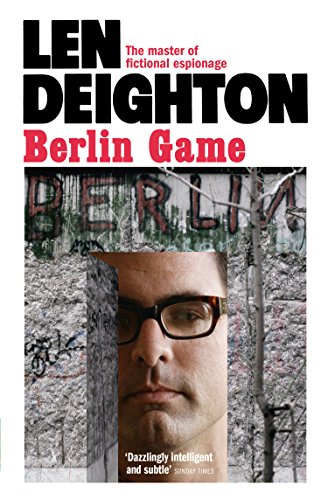
From the closing days of World War II until the destruction of the Wall four decades later, Berlin was the epicenter of the clash between East and West. Divided into four zones by an agreement signed in London in 1944, the German capital became the site of nonstop intrigue involving the intelligence agencies of all four powers. The clash was especially intense between Britain’s MI6 and the Soviet KGB. So, it’s no surprise that the city became a favorite setting of spy novelists from John le Carré, Joseph Kanon, Philip Kerr, Volker Kutscher, and so many others, but especially the English. One of the most celebrated of those authors to explore Cold War espionage is Len Deighton, and his reputation rests in part on his novel, Berlin Game.
Estimated reading time: 3 minutes
Berlin Game, the first of ten books (three trilogies and a prequel), introduces MI6 officer Bernard Samson. As the novel opens, Samson is a veteran field officer. He has had enough experience with treachery on both sides of the conflict to now view the game as morally ambivalent, much like John le Carré’s George Smiley. He had grown up in Berlin, where his father had run the Berlin Field Unit, and had stayed in touch with a number of school friends. Most of them are now involved as assets in his work as a spy. They’re part of the Brahms network that exists to funnel secret information from Brahms Four, an official in the East German government.
Berlin Game (Bernard Samson #1) by Len Deighton (1983) 332 pages ★★★★★
A morally ambivalent view of Cold War espionage
Unfortunately, Brahms Four feels threatened and wants to be exfiltrated to the West. But Samson’s superiors want him to return to Berlin to persuade Brahms Four to hold out for another couple of years. The agent’s reports are invaluable to the British Government. And Samson is the only serving officer who knows Brahms Four personally and is thought to be the only individual who can keep the intelligence flowing to London.
In the course of following through on his assignment, Samson comes to suspect that a high-level official within MI6 is a Soviet mole. And as his meeting with Brahms Four moves closer, evidence continues to mount and the danger to Samson’s life becomes increasingly great. Like le Carré’s work, Deighton’s novel adds a realistic dimension to our present-day understanding of Cold War espionage.
An amusing sidelight
If you’re old enough, you may remember hearing President John F. Kennedy declare on a visit to Berlin, “Ich bin in Berliner” (I am a Berliner). However, the people of the city regarded it as a joke. “A Berliner is a doughnut,” according to Deighton. I’d read this back in the day but had long since forgotten it.
For related reading
I’ve reviewed three other books by Len Deighton:
- Mexico Set – Bernard Samson #2 (In Len Deighton’s classic spy series, Bernard Samson goes to Mexico)
- SS-GB (In an alternate history, the Nazis occupy England)
- Bomber (An intensive look a single RAF Bomber Command mission in World War II)
You might also enjoy my posts:
- The 15 best espionage novels
- Good nonfiction books about espionage
- The best spy novelists writing today
- Top 10 mystery and thriller series
- Top 10 historical mysteries and thrillers
And you can always find my most popular reviews, and the most recent ones, on the Home Page.



























Mal, I love this Game-Set-Match series! Agree 100% with your great review. I understand that Len Deighton was apparently also an enthusiastic home chef, who published comic-book style “cookstrips” and two cookbooks which are well-regarded. See: https://www.theguardian.com/food/series/len-deightons-new-cookstrips
Didn’t know that. Thanks.